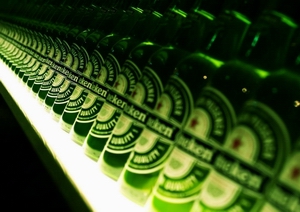 Mexico's top brewers have reached an agreement with the country's anti-trust authority to limit their sales exclusivity contracts with corner stores, bars and restaurants, allowing more elbow room for craft brewers and other players in a lucrative market split by Anheuser-Busch InBev N.V.'s (BUD) Grupo Modelo unit and Heineken NV's (HEIA.AE) Cerveceria Cuauhtemoc Moctezuma.
Mexico's top brewers have reached an agreement with the country's anti-trust authority to limit their sales exclusivity contracts with corner stores, bars and restaurants, allowing more elbow room for craft brewers and other players in a lucrative market split by Anheuser-Busch InBev N.V.'s (BUD) Grupo Modelo unit and Heineken NV's (HEIA.AE) Cerveceria Cuauhtemoc Moctezuma.The Federal Competition Commission stopped short of prohibiting the agreements entirely, saying such contracts can make the Mexican retail chain more efficient, for instance by supplying small businesses with financing for improvements and expansion. At the same time, if such deals are extensive, they could act as "barriers to market entry for other competitors," the anti-trust authority said in a statement.
The agreed upon terms address a 2010 complaint lodged by SABMiller PLC (SAB.LN), the world's second-largest brewer by sales, and several Mexican microbrewers.
The Mexican beer market is the world's fifth-biggest, according to Euromonitor. It is also a virtual duopoly, with Modelo brands like Corona claiming around 58% of the 67 million hectoliters of brew sold in Mexico each year, while Cerveceria Cuauhtemoc brands like Tecate account for 41%.
The brewers must cap exclusivity agreements to no more than 25% of their total points of sale, and gradually reduce that number to 20% by 2018, the anti-trust authority said. All such agreements must be in writing. The brewers will also be obligated to allow craft brewers to sell their beers in bars and restaurants where the big two brewers have locked in exclusive pouring rights.
Violations of the terms laid out by the commission could result in fines representing up to 8% of the brewer's annual sales in Mexico, the regulator said. The country is Heineken's largest market, accounting for about 16% of sales, while it represents around 13% of AB InBev's pro forma sales, according to Credit Suisse calculations.
In separate statements, both AB InBev and Heineken said they will comply with the conditions laid out by the anti-trust authority. There is no obligation for the brewers to modify existing supply agreements, or to open competition at the brewers' company-owned or affiliated retail outlets, at hotel chains or at sponsored events, Heineken said.
Around half of the beer sold in Mexico each year is channeled through small, mom-and-pop convenience stores, many of which agree to sell only one of the two brewers' brands in exchange for beer-logo awnings, signs or refrigerators, as well as discounts on beer purchases, credit and even assistance with local permits.
Restaurants and bars account for around 15% of beer sales in Mexico, while craft brewers say those watering holes represent the ideal entry point for their brews.
No matter how far the antitrust ruling reaches, analysts say the strength of Mexico's heritage beer brands, as well as those brewers' expansive distribution muscle, will remain a barrier to entry for others attempting to penetrate the market.





